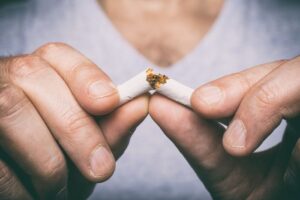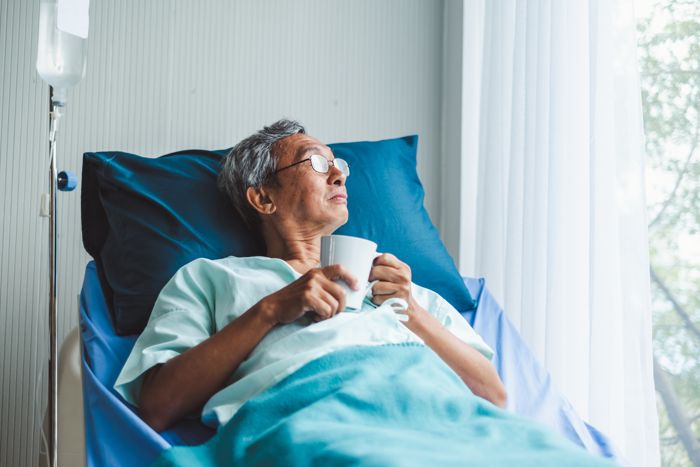Key takeaways
- Smoking hinders post-surgery healing, delays recovery.
- Chemicals in cigarettes impairs blood vessels.
- Weaker immune system invites infections
- Smoking post-surgery raises mortality risk
- Quitting weeks before surgery reduces anesthesia-related problems
A surgical operation involves creating a huge laceration or gash on your body to fix an issue with one of your organs, arteries, and other complications. They take much more time and need special post-operative care to heal properly.
Smoking right after surgery could cause a huge number of complications that can endanger your health. Smoking also greatly hinders the healing process by weakening your immune system, increasing the risk of infections and slowing your surgical wounds from healing up.
It pays to stop smoking after any kind of surgical operation. In today’s post, we’ll take a look at the consequences of smoking right after a complicated surgery.
Delayed Healing
Wondering why you’re taking a month rather than just a few weeks to recover from your surgery? You can blame cigarettes.
Chat to an Aussie GP today
Friendly phone consultations
TGA-authorised Aussie doctors
Nicotine vaping scripts available
The chemicals present in cigarette smoke have negative effects on post-operative care and recovery. Nicotine and other substances in cigarettes constrict blood vessels, reducing the flow of oxygen and essential nutrients to the surgical site.
With a diminished blood supply, your body’s ability to heal effectively is greatly impaired. In severe cases, this can lead to delayed wound healing and even tissue necrosis.
If you want to heal up fast and avoid endangering your life (which was why you had surgery in the first place), it’s best to stop smoking for good.
Poor Immune System Performance
A weaker immune system means more invaders can come in and endanger your health.
Harmful substances like carbon monoxide in cigarettes impair the immune system’s ability to fight off infections and promote healing, leaving smokers more susceptible to infections and at a higher risk of experiencing complications during the recovery period.
You probably don’t want added expenses to your surgery and health needs, so just stop smoking before and after the operation.
A Higher Risk of Death
Smoking right after surgery carries higher mortality rates regardless of the operation’s probability of success.
Your body is vulnerable and strained right after any surgery, and it needs all the nutrients and supplements it can get to recover your body rapidly. By smoking, you consume toxins and carcinogens present in cigarettes that exacerbate the vulnerable state of the body.
That means if you don’t stop smoking, your surgical recovery might lead to severe health complications with potentially fatal outcomes.
Why Quit Smoking Before Your Surgery
We don’t mean to scare you with the facts mentioned about smoking after surgery. But it’s the truth.
You’ll have a better time during and after surgery if you quit smoking before your surgery.
Quitting smoking a few weeks before surgery eliminates some of the harmful toxins in cigarettes from the system, reducing the risk of complications both during and after the surgery.
Stopping smoking a month before surgery avoids anesthesia-related problems that can cause respiratory difficulties and poor oxygenation. Kicking the habit before surgery also enhances the body’s ability to heal during the post-operative period.
Why Quit Smoking Even Without Surgery
As mentioned, smoking is the cause of many surgical complications. But, it is also an easily preventable health burden worldwide.
Apart from the well-known health concerns, when you quit smoking, you’ll also enjoy better skin and save more cash for holidays, school fees, or a car down payment.
In as short as 6 days, you’ll feel plenty of physical benefits that feel like a huge burden was lifted from your shoulders.
Clearly, there are no downsides to quitting smoking for good, even if you don’t have to go through surgery and leave your body in a vulnerable state.
Helpful Tips to Stop Smoking for Good
Whether you’re having difficulty stopping smoking months before your surgery or just want to stop for good, here are a few steps to get you in the right direction.
Consult a GP
GPs have helped many ex-smokers find success in their path towards quitting smoking. They can give you a personalised smoking cessation plan with your nicotine consumption and other needs in mind.
GPs can also prescribe tools, such as nicotine replacement therapy (NRT) products and nicotine vaping products (NVPs) from pharmacies to help you cope with nicotine withdrawals and cravings.
Nicotine Replacement Therapy (NRT) Products
As it says in the name, nicotine replacement means providing a small dose of nicotine to cushion withdrawal effects and cravings. Your brain quickly notices the absence of nicotine during cold turkey quitting, so with NRT products, you have a better chance to control your urges and keep yourself on the right path.
But, NRT doesn’t work for everyone. If it’s not quite doing the trick, your GP can prescribe NVPs from pharmacies.
Nicotine Vaping Products (NVPs)
The alternative, second-line solution to NRT is pharmacy-available NVPs.
Unlike their illegal and dangerous counterparts, NVP products sold in pharmacies are made under stringent pharmaceutical standards on the manufacturing process and ingredients, are toxicologically assessed for inhalation, are locally insured, and are specifically designed to help you stop smoking.
Pharmacy NVPs can be effective because they imitate the throat hit and hand-to-mouth gesture associated with smoking – things that are engrained in most smokers.
Despite being second-line solutions, the latest Cochrane Review found high-certainty evidence that NVPs are more effective than NRT in helping people stop smoking.
Summary
There is no situation where smoking is beneficial to surgery. In fact, there is no situation where smoking is helpful at all. Patients should never smoke right after surgery, and people should take time to stop smoking before their surgery to improve healing and avoid complications.
You’re probably reading this because you want to know when to stop smoking before and after surgery. We hope you found this information useful. If you’re looking to quit, we can also help.
Smokefree Clinic gives you access to many medically reviewed and trustworthy resources that can inform and aid you in your path to wellness, so have a look around!
If you’re ready to get started, Smokefree can connect you to Australian healthcare professionals who excel in helping patients quit smoking for good.





